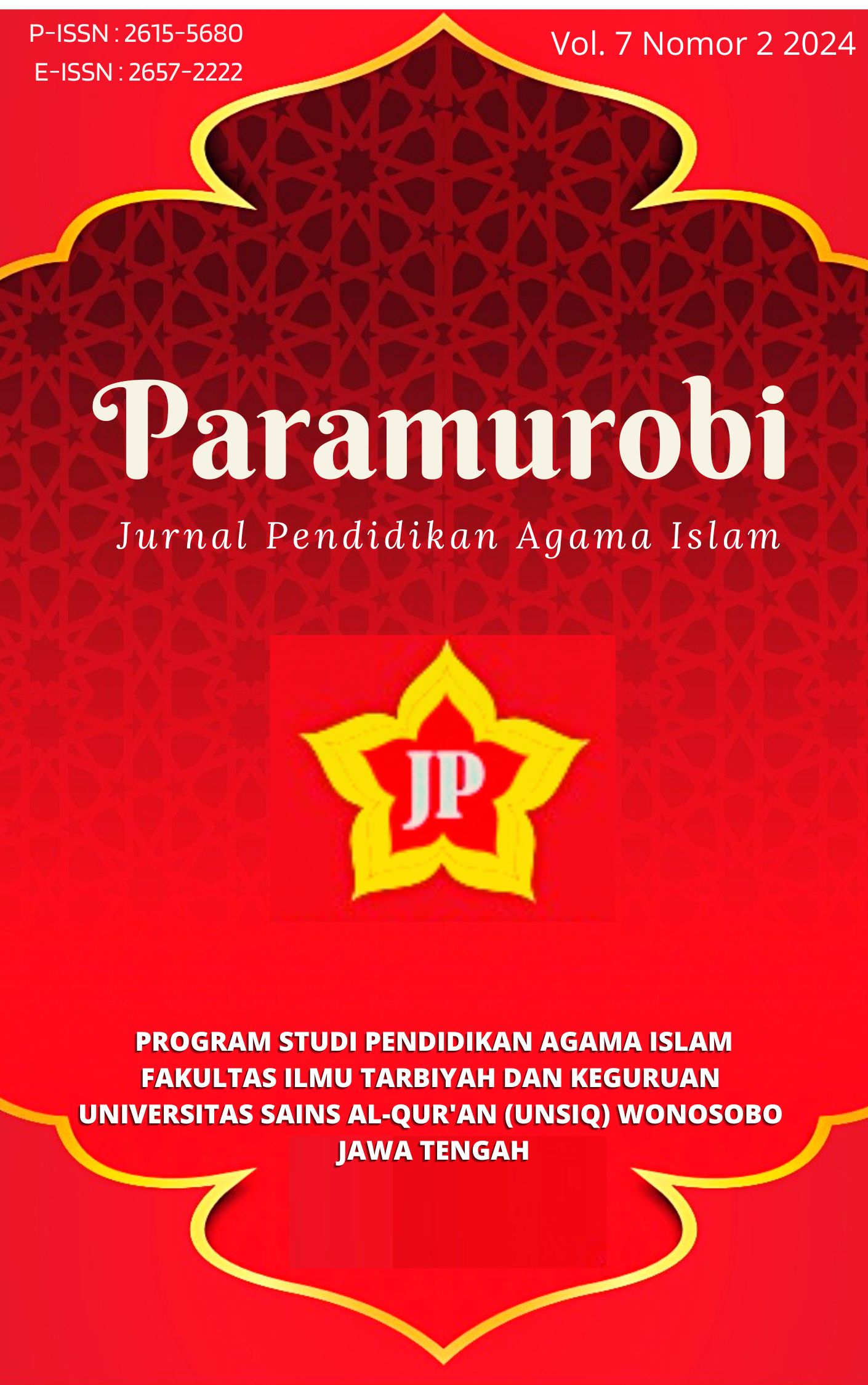TEKNIK PENILAIAN FORMATIF ASPEK KOGNITIF MATA PELAJARAN PAI KURIKULUM MERDEKA
DOI:
https://doi.org/10.32699/paramurobi.v7i2.7124Keywords:
Formative Assessment,, Cognitive Learning Outcomes, Islamic Education, Independent CurriculumAbstract
This research was conducted to improve students' understanding and skills in Islamic Religious Education subjects. Formative assessment practices are useful for successfully teaching PAI material in the independent curriculum. In presenting the data, this research uses a qualitative descriptive approach, a type of library research through various sources related to the research topic. This research aims to measure and determine the level of student's understanding through formative assessment efforts on cognitive aspects of learning outcomes. The results obtained in this research indicate that implementing cognitive assessments in Islamic Religious Education learning can be carried out using portfolio assessment models, oral, written Penilaiants, and project assessments.
References
Ananda, Wiga, and Maemonah Maemonah. “Implementasi Asesmen Kognitif Berbasis HOTS Materi PAI Dengan Pembelajaran Berbasis Proyek Di Sekolah Menengah Pertama.” Edukatif : Jurnal Ilmu Pendidikan 4, no. 5 (2022): 6564–75. https://doi.org/10.31004/edukatif.v4i5.3179.
Arikunto, and Suharsimi. Dasar-Dasar Evaluasi Pendidikan. Jakarta: Bumi Aksara, 1996.
Azizah, Nurul, Zuhrotul Mufidah, and Rosendah Dwi Maulaya. “Pengembangan Asessmen Pembelajaran PAI Pada Kurikulum Merdeka Belajar.” Seminar Nasional Ilmu Pendidikan, Fakultas Keguruan Dan Ilmu Pendidikan2023, 2023, 11–24.
Daryanto. Evaluasi Pendidikan. Jakarta: Rineka Cipta, 2014.
Slameto. BELAJAR & FAKTOR-FAKTOR YANG MEMPENGARUHI. Cet 6. jakarta: PT RINEKA CIPTA, 2020.
Idawati, Idawati. “Upaya Meningkatkan Hasil Belajar Biologi Siswa Melalui Model Pembelajaran Discovery Learning Di Kelas XI. IPA. I SMAN 2 Lengayang.” Journal on Education 5, no. 2 (2023): 3773–78. https://doi.org/10.31004/joe.v5i2.1058.
Ihsan, Miftahul, and Maemonah. “Penilaian Formatif Dalam Kurikulum Merdeka Pada Pemebelajaran Pendidikan Agama Islam Di Kelas IV SDN Sekumpul 1 Martapura.” Tarbiyah Islamiyah: Jurnal Ilmiah Pendidikan Agama Islam 13 (2) (2023): 79–90. https://doi.org/10.18592/jtipai.v13i2.9872.
Kaufeldt, Martha. Wahai Para Guru, Ubahlah Cara Mengajarmu. Diterjemahkan oleh Hendarto Raharjo. Indeks, 2008.
Laila M.K, Putri Zalika. “Peran Penilaian Formatif Terhadap Motivasi Belajar Mahasiswa, Sebuah Tinjauan Pustaka.” Syifa’ MEDIKA: Jurnal Kedokteran Dan Kesehatan 5, no. 1 (2014): 56. https://doi.org/10.32502/sm.v5i1.1424.
M. Ilyas Ismail. “Pengaruh Intensitas Penilaian Formatif Terhadap Hasil Belajar IPA Dengan Mengontrol Pengetahuan Awal Siswa.” Fakultas Tarbiyah dan Keguruan Universitas Islam Negeri Alauddin Makassar, t.t.
Mardapi, and Djamari. Pengukuran Penilaian Dan Evaluasi Pendidikan. Yogyakarta: Nuha Medica, 2012.
R. Nurhayati, Sudirman P, Sartina, Agus Suwito, Diarti Andra Ningsih, Hasratul Janna, and Fajar Rahmat. “Kendala-Kendala Yang Dihadapi Guru PAI Dalam Menerapkan Self-Assessment Di Madrasah Allyah Negri 4 Bone.” Prosiding Seminar Nasional Fakultas Tarbiyah Dan Ilmu Keguruan IAIM Sinjai 2 (2023): 32–38. https://doi.org/10.47435/sentikjar.v2i0.1837.
Sagita Mawaddah, Fitri, and Fakultas Keguruan dan. “Assesmen Dalam Kurikulum Merdeka Belajar.” Jurnal Literasi Dan Pembelajaran Indonesia 3, no. 1 (2023): 8–13.
Suhartono, Suhartono, and Rosi Patma. “Upaya Peningkatan Hasil Belajar Siswa Mata Pelajaran Fiqih Materi Pembelajaran Haji Dan Umrah Melalui Penerapan Metode Advokasi.” Al-I’tibar : Jurnal Pendidikan Islam 5, no. 1 (2018): 10–19. https://doi.org/10.30599/jpia.v5i1.309.
Taufik Abdullah Attamimi, Rizki Fauzia Ahmad, Rizky Al Fajar. “Teknik Pengolahan Dan Penilaian Hasil Belajar Aspek Kognitif Dalam Evaluasi Pembelajaran: Studi Analisis Pembelajaran Daring.” Al-Madrasah: Jurnal Pendidikan Madrasah Ibtidaiyah 7, no. 1 (2023): 139. https://doi.org/10.35931/am.v7i1.1480.
Ulfah, Ulfah, and Opan Arifudin. “Pengaruh Aspek Kognitif, Afektif, Dan Psikomotor Terhadap Hasil Belajar Peserta Didik.” Jurnal Al-Amar (JAA) 2, no. 1 (2021): 6. http://ojs-steialamar.org/index.php/JAA/article/view/88.
UNDANG-UNDANG DASAR NEGARA REPUNLIK INDONESIA 1945
Uzza, Hamzah Usaid, and Dwi Setia Kurniawan. “Studi Komparasi Kurikulum 2013 Dan Kurikulum Merdeka Pada Mata Pelajaran Bahasa Arab Di Madrasah.” JIT: Jurnal Ilmu Tarbiyah 2, no. 1 (2023): 91–108.
Wisman, Yossita. “Teori Belajar Kognitif Dan Implementasi Dalam Proses Pembelajaran.” Jurnal Ilmiah Kanderang Tingang 11, no. 1 (2020): 209–15. https://doi.org/10.37304/jikt.v11i1.88.
Downloads
Published
Issue
Section
License
Copyright Notice
1. Authors retain copyright and grant the journal right of first publication with the work simultaneously licensed under a Creative Commons Attribution License (CC BY-SA 4.0) that allows others to share (copy and redistribute the material in any medium or format), and adapt (remix, transform, and build upon the material) the work for any purpose, even commercially with an acknowledgement of the work's authorship and initial publication in this journal.
2. Authors are able to enter into separate, additional contractual arrangements for the non-exclusive distribution of the journal's published version of the work (e.g., post it to an institutional repository or publish it in a book), with an acknowledgement of its initial publication in this journal.
3. Authors are permitted and encouraged to post their work online (e.g., in institutional repositories or on their website) prior to and during the submission process, as it can lead to productive exchanges, as well as earlier and greater citation of published work (See The Effect of Open Access).





